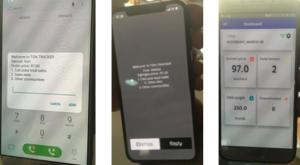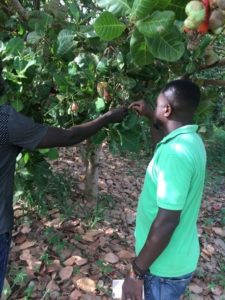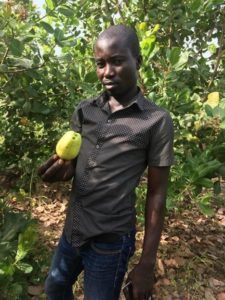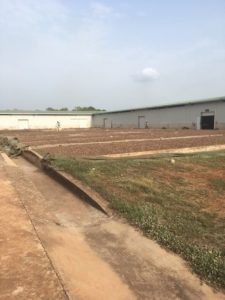For Spring Break, I decided to visit Ghana to study the cashew value-chain by engaging with market participants. This study trip was made possible through the African Studies Grants for Professionalization: Research, Internships, and Projects. Upon arrival in Accra, I met with a member of the Ghana Standards Authority (“GSA”) to discuss ways in which the regulatory agency works with businesses to adhere to international standards. The GSA seal is displayed prominently on many goods produced in the country.
I had the opportunity to meet with 2 computer science students developing a technology solution called TonTracker to help the Ghanaian cashew industry. They have developed a text-based solution to help cashew farmers obtain and share market information. Moreover, there is a smartphone application for the cashew buying agents to help them record purchases and create invoices. Finally, a website is in progress to help larger cashew (and other agriculture) companies manage their inventories and personnel with the hope to use mobile money, blockchain, and machine learning/AI in the future.
The next chapter of the trip involves visits to small-holder farmers in the Brong-Ahafo region, which is the main region for cashews in Ghana and borders Cote D’Ivoire. The cashew farmers that I met with were diverse; they differed across location, plot size, education level, etc. All farmers mentioned that they would prefer to have a fixed-price cashew industry akin to neighbor Cote D’Ivoire, which is heavily regulated by the government (and bans raw cashew nut exports).
The next leg of the journey included a stop in Sampa to meet with larger, more sophisticated cashew buying agents. These buying agents worked with local aggregators of cashews to purchase a specific quality and quantity of cashews for export. Once exported, the cashews would be further processed and sold into the global market.
The final day was spent at 1 of 2 active cashew processing facilities in Ghana (There were 2 Ghanaian owned processing facilities in Techiman, Ghana, but the facilities are no longer operating). The company, MIM Cashew, was not currently operating its cashew processing facility, but cashew brandy production was underway. Operations for cashew nut processing were currently in the drying stage (see picture below; So many cashews!).
For my final capstone paper, I will be further researching Ghana’s cashew value-chain, and I am working with fellow student, Dickson Effah, to begin a non-profit organization called Cashew Nfaso (literally means Cashew Benefit) to provide technical assistance & training to small-holder cashew farmers in the Brong-Ahafo region. We aim to help them improve their health, wealth, and the livelihoods of themselves and their families. Please consider visiting our website, cashew-nfaso.com to learn more. We will use local talent, practice complete transparency, and utilize proper monitoring and evaluation, etc. to accurately assess our impact.





